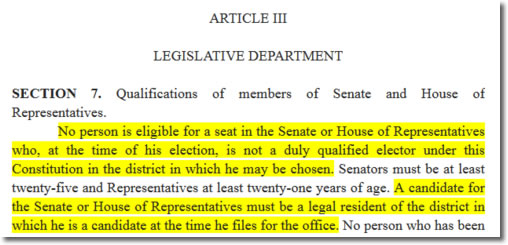
By Andy Brack, editor and publisher | You, like most people, probably figure that candidates who run for state House and Senate are required to live in the district in which they run.
You’d be pretty much right. But there’s a big loophole: You only have to live in the district on election days and on the day you file for the office.
![]() “All candidates have to be a registered voter in their geographical district on election day. In other words, they have to be eligible to vote for themselves,” said Chris Whitmire of the S.C. Election Commission. “House and Senate candidates have an extra residency requirement – they must be a resident of the district at the time they file for office.”
“All candidates have to be a registered voter in their geographical district on election day. In other words, they have to be eligible to vote for themselves,” said Chris Whitmire of the S.C. Election Commission. “House and Senate candidates have an extra residency requirement – they must be a resident of the district at the time they file for office.”
Translation: It’s perfectly legal to cherry-pick a legislative district and move into it while having another more substantial home outside of the district.
Unfortunately, it happens — and probably more often than you’d think. By all reports, there are two state senators who died in recent years whose real, principal residences were homes located outside their districts. Last year in Charleston, a candidate moved into the city to run for mayor, but now has returned to a beach home.
In recent months, there have been at least two candidates who have moved into accommodations in legislative districts in which they’re now running, even though they have other homes outside the districts.
 Charleston real estate developer and GOP candidate William Cogswell, who is running for the open downtown Charleston and Mount Pleasant seat held currently by Rep. Chip Limehouse, owns a million-dollar Wadmalaw Island home that’s more than 20 miles from House District 110. But late last year, tired of fighting island traffic, he and his family moved into a leased South of Broad townhouse near where he grew up. The family, he said, currently is looking for a home to buy downtown — win or lose the five-way primary election. It’s a stretch, he adds, to suggest that he’s moved into the district just to run for the seat as his roots are there and he’s involved in Charleston community service now. It is true, though, that the lousy traffic sparked the move and his candidacy. “My kids ride their bikes to school,” he said.
Charleston real estate developer and GOP candidate William Cogswell, who is running for the open downtown Charleston and Mount Pleasant seat held currently by Rep. Chip Limehouse, owns a million-dollar Wadmalaw Island home that’s more than 20 miles from House District 110. But late last year, tired of fighting island traffic, he and his family moved into a leased South of Broad townhouse near where he grew up. The family, he said, currently is looking for a home to buy downtown — win or lose the five-way primary election. It’s a stretch, he adds, to suggest that he’s moved into the district just to run for the seat as his roots are there and he’s involved in Charleston community service now. It is true, though, that the lousy traffic sparked the move and his candidacy. “My kids ride their bikes to school,” he said.
Charleston attorney and GOP candidate Sandy Senn holds a money advantage over four other candidates in an open seat held by Republican state Sen. Paul Thurmond. She lived in Folly Beach until the fall, when she took an in-district townhouse in West Ashley, now listed by candidacy records as her residence. The townhouse, just blocks from her longtime law office in the district, is also where she is registered to vote. Property records show she owns a million-dollar house in a gated Folly Beach community that is about four miles outside of the district.
 “I’ve lived and worked in this district for 22 years until we got gerrymandered out,” said Senn, adding that she would continue to live in the district if she won and has never intended to sell the beach house because it’s paid for.
“I’ve lived and worked in this district for 22 years until we got gerrymandered out,” said Senn, adding that she would continue to live in the district if she won and has never intended to sell the beach house because it’s paid for.
To be clear, there’s nothing legally wrong with anyone who moves into a district to run for office. In fact, some would say residency is the kind of issue that should come out naturally during the campaign process, so why sweat it? Based on this year’s campaigns and past history, residency hasn’t been much of an issue.
In the larger scheme of things, there’s very little the state Election Commission can do about current candidate residency issues because loopholes are big enough to drive a truck through. So here’s what needs to happen: The General Assembly should get rid of the residency squishiness by requiring candidates to live in districts on more than filing and election days In fact, there should be a proactive candidate proof of residency — just like voters now are currently required to show state identification to vote.
Voters ought to expect to see their elected officials frequently in grocery stores, barber shops, gyms and restaurants inside the districts they represent. In this era of transparency and accountability, it ought to be crystal clear where someone really lives when they’re running for office. Anything less just isn’t right.
Have a comment? Send to: feedback@statehousereport.com



 We Can Do Better, South Carolina!
We Can Do Better, South Carolina!
























